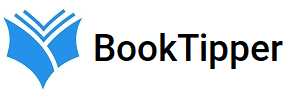Featured Non-Fiction & Biography

THE SHIP BENEATH THE ICE
by Mensun Bound
“As thrilling as any tale from the heroic age of exploration. … Bound’s account is a triumph. The storytelling is piano-wire taut, the writing saturated with polar moodiness.” ― Sunday Times
The inside story of how the Endurance, Ernest Shackleton’s legendary lost ship, was found in the most hostile sea on Earth, told by the expedition’s Director of Exploration.
On November 21, 1914, after sailing more than ten thousand miles from Norway to the Antarctic Ocean, the Endurance finally succumbed to the surrounding ice. Ernest Shackleton and his crew had navigated the 144-foot, three-masted wooden vessel to Antarctica to become the first to cross the barren continent, but early season pack ice trapped them in place offshore. They watched in silence as the ship’s stern rose twenty feet in the air and disappeared into the frigid sea, then spent six harrowing months marooned on the ice in its wake. Seal meat was their only sustenance as Shackleton’s expedition to push the limits of human strength took a new form: one of survival against the odds.
As this legendary story entered the annals of polar exploration, it inspired a new global race to find the wrecked Endurance, by all accounts “the world’s most unreachable shipwreck.” Several missions failed, thwarted, as Shackleton was, by the unpredictable Weddell Sea. Finally, a century to the day after Shackleton’s death, renowned marine archeologist Mensun Bound and an elite team of explorers discovered the lost shipwreck. Nearly ten thousand feet below the ice lay a remarkably preserved Endurance, its name still emblazoned on the ship’s stern.
The Ship Beneath the Ice chronicles two dramatic expeditions to what Shackleton called “the most hostile sea on Earth.” Bound experienced failure and despair in his attempts to locate the wreck, and, like Shackleton before him, very nearly found his vessel frozen in ice.
Complete with captivating photos from the 1914 expedition and of the wreck as Bound and his team found it, this inspiring modern-day adventure narrative captures the intrepid spirit that joins two mariners across the centuries—both of whom accomplished the impossible.

BLOOD MONEY
by Kathleen McLaughlin
A “haunting” (Anne Helen Petersen, author of Can’t Even) and deeply personal investigation of an underground for-profit medical industry and the American underclass it drains for blood and profit.
Journalist Kathleen McLaughlin knew she’d found a treatment that worked on her rare autoimmune disorder. She had no idea it had been drawn from the veins of America’s most vulnerable.
So begins McLaughlin’s ten-year investigation researching and reporting on the $20-billion-a year business she found at the other end of her medication, revealing an industry that targets America’s most economically vulnerable for immense profit.
Assigned to work in China, McLaughlin hesitated to utilize that country’s scandal-plagued plasma supply—outbreaks throughout the 1990s and early 2000s struck thousands with blood-borne diseases as impoverished areas of the country were milked for blood with reckless abandon. Instead, McLaughlin becomes her own runner, hiding American plasma in her luggage during trips from the United States to China. She finishes the job, but never could get the plasma story out of her head. Suspicions become certainties when a source from the past, a visiting Chinese researcher, warns McLaughlin of troubling echoes between America’s domestic plasma supply chain and the one she’d seen spin out into chaos in China.
Blood Money shares McLaughlin’s decade-long mission to learn the full story of where her medicine comes from. She travels the United States in search of the truth about human blood plasma and learns that twenty million Americans each year sell their plasma for profit—a human-derived commodity extracted inside our borders to be processed and packaged for retail across the globe. She investigates the thin evidence pharmaceutical companies have used to push plasma as a wonder drug for everything from COVID-19 to wrinkled skin. And she unearths an American economic crisis hidden in plain sight: single mothers, college students, laid-off Rust Belt auto workers, and a booming blood market at America’s southern border, where collection agencies target Mexican citizens willing to cross over and sell their plasma for substandard pay.
McLaughlin’s findings push her to ask difficult questions about her own complicity in this wheel of exploitation, as both a patient in need and a customer who stands to benefit from the suffering of others. Blood Money weaves together McLaughlin’s personal battle to overcome illness as a working American with an electrifying exposé of capitalism run amok in a searing portrait that shows what happens when big business is allowed to feed unchecked on those least empowered to fight back.
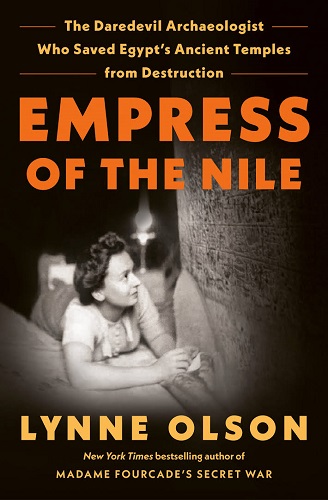
EMPRESS OF THE NILE
by Lynne Olson
The remarkable story of the intrepid French archaeologist who led the international effort to save ancient Egyptian temples from the floodwaters of the Aswan Dam, by the New York Times bestselling author of Madame Fourcade’s Secret War
In the 1960s, the world’s attention was focused on a nail-biting race against time: Fifty countries contributed nearly a billion dollars to save a dozen ancient Egyptian temples, built during the height of the pharaohs’ rule, from drowning in the floodwaters of the massive new Aswan High Dam. But the extensive press coverage at the time overlooked the gutsy French archaeologist who made it all happen. Without the intervention of Christiane Desroches-Noblecourt, the temples would now be at the bottom of a vast reservoir. It was an unimaginably large and complex project that required the fragile sandstone temples to be dismantled, stone by stone, and rebuilt on higher ground.
A willful real-life version of Indiana Jones, Desroches-Noblecourt refused to be cowed by anyone or anything. During World War II she joined the French Resistance and was held by the Nazis; in her fight to save the temples she challenged two of the postwar world’s most daunting leaders, Egypt’s President Nasser and France’s President de Gaulle. As she told a reporter, “You don’t get anywhere without a fight, you know.”
Yet Desroches-Noblecourt was not the only woman who played an essential role in the historic endeavor. The other was Jacqueline Kennedy, who persuaded her husband to call on Congress to help fund the rescue effort. After years of Western plunder of Egypt’s ancient monuments, Desroches-Noblecourt did the opposite. She helped preserve a crucial part of Egypt’s cultural heritage, and made sure it remained in its homeland.

ALL THE KNOWLEDGE IN THE WORLD
by Simon Garfield
From the “deliriously clever” (Boston Globe) Simon Garfield, New York Times bestselling author of Just My Type, comes the wild and fascinating story of the encyclopedia, from Ancient Greece to the present day.
“A brilliant book about knowledge itself.” —Deirdre Mask, author of The Address Book
“Magnificent. … A perfectly styled work of literature – at times sad, at times funny, but always full of life.” —Engineering & Technology Magazine
The encyclopedia once shaped our understanding of the world. Created by thousands of scholars and the most obsessive of editors, a good set conveyed a sense of absolute wisdom on its reader. Contributions from Albert Einstein, Sigmund Freud, Orville Wright, Alfred Hitchcock, Marie Curie and Indira Gandhi helped millions of children with their homework. Adults cleared their shelves in the belief that everything that was explainable was now effortlessly accessible in their living rooms.
Now these huge books gather dust and sell for almost nothing on eBay. Instead, we get our information from our phones and computers, apparently for free. What have we lost in this transition? And how did we tell the progress of our lives in the past?
All the Knowledge in the World is a history and celebration of those who created the most ground-breaking and remarkable publishing phenomenon of any age. Simon Garfield, who “has a genius for being sparked to life by esoteric enthusiasm and charming readers with his delight” (The Times), guides us on an utterly delightful journey, from Ancient Greece to Wikipedia, from modest single-volumes to the 11,000-volume Chinese manuscript that was too big to print. He looks at how Encyclopedia Britannica came to dominate the industry, how it spawned hundreds of competitors, and how an army of ingenious door-to-door salesmen sold their wares to guilt-ridden parents. He reveals how encyclopedias have reflected our changing attitudes towards sexuality, race, and technology, and exposes how these ultimate bastions of trust were often riddled with errors and prejudice.
With his characteristic ability to tackle the broadest of subjects in an illuminating and highly entertaining way, Simon Garfield uncovers a fascinating and important part of our shared past and wonders whether the promise of complete knowledge—that most human of ambitions—will forever be beyond our grasp.

UNLIKELY HEROES
by Derek Leebaert
“Leebaert has done the near impossible―crafted a fresh and challenging portrait of the man and his inner circle.”― Richard Norton Smith, author of An Uncommon Man, former director of the Hoover, Eisenhower, Reagan, and Ford presidential libraries.
“A fascinating and absorbing analysis of FDR’s brilliantly chosen team of four courageous and creative men and women.”―Susan Dunn, author of 1940: FDR, Willkie, Lindbergh, Hitler―the Election Amid the Storm, Massachusetts Professor of Humanities, Williams College.
Drawing on new materials, Unlikely Heroes constructs an entirely fresh understanding of FDR and his presidency by spotlighting the powerful, equally wounded figures whom he raised up to confront the Depression, then to beat the Axis.
Only four people served at the top echelon of President Franklin Roosevelt’s Administration from the frightening early months of spring 1933 until he died in April 1945, on the cusp of wartime victory. These lieutenants composed the tough, constrictive, long-term core of government. They built the great institutions being raised against the Depression, implemented the New Deal, and they were pivotal to winning World War II.
Yet, in their different ways, each was as wounded as the polio-stricken titan. Harry Hopkins, Harold Ickes, Frances Perkins, and Henry Wallace were also strange outsiders. Up to 1933, none would ever have been considered for high office. Still, each became a world figure, and it would have been exceedingly difficult for Roosevelt to transform the nation without them. By examining the lives of these four, a very different picture emerges of how Americans saved their democracy and rescued civilization overseas. Many of the dangers that they all overcame are troublingly like those America faces today.
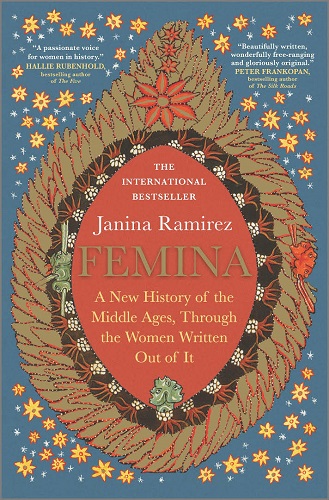
FEMINA
by Janina Ramirez
A groundbreaking reappraisal of medieval femininity, revealing why women have been written out of history and why it matters
The Middle Ages are seen as a bloodthirsty time of Vikings, saints and kings; a patriarchal society that oppressed and excluded women. But when we dig a little deeper into the truth, we can see that the “Dark” Ages were anything but.
Oxford and BBC historian Janina Ramirez has uncovered countless influential women’s names struck out of historical records, with the word FEMINA annotated beside them. As gatekeepers of the past ordered books to be burned, artworks to be destroyed, and new versions of myths, legends and historical documents to be produced, our view of history has been manipulated.
Only now, through a careful examination of the artifacts, writings and possessions they left behind, are the influential and multifaceted lives of women emerging. Femina goes beyond the official records to uncover the true impact of women, such as:
- Jadwiga, the only female king in Europe
- Margery Kempe, who exploited her image and story to ensure her notoriety
- Loftus Princess, whose existence gives us clues about the beginnings of Christianity in England
In Femina, Ramirez invites us to see the medieval world with fresh eyes and discover why these remarkable women were removed from our collective memories.
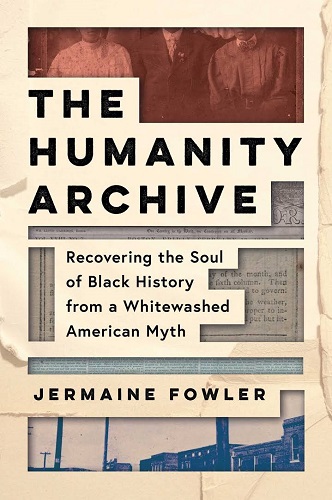
THE HUMANITY ARCHIVE
by Jermaine Fowler
This sweeping survey of Black history shows how Black humanity has been erased and how its recovery can save the humanity of us all.
“An innovative reading of Black history, gracefully joining it to the larger history of all humankind.” — Kirkus Starred Review
Named by Essence Magazine as one of “31 Books You Must Read” in 2023.
Using history as a foundation, The Humanity Archive uses storytelling techniques to make history come alive and uncover the truth behind America’s whitewashed history.
The Humanity Archive focuses on the overlooked narratives in the pages of the past.
Challenging dominant perspectives, author Jermaine Fowler goes outside the textbooks to find recognizably human stories. Connecting current issues with the heroic struggles of those who have come before us, Fowler brings hidden history to light.
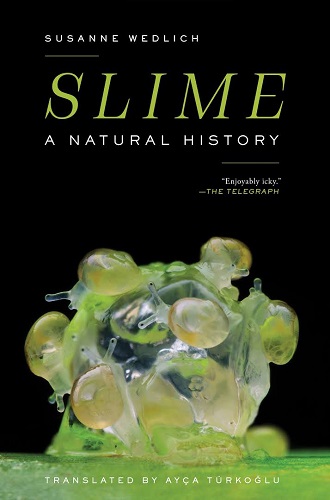
SLIME: A NATURAL HISTORY
by Susanne Wedlich
A groundbreaking, witty, and eloquent exploration of slime that will leave you appreciating the nebulous and neglected sticky stuff that covers our world, inside and out.
Slime. The very word seems to ooze oily menace, conjuring up a variety of unpleasant associations: mucous, toxins, reptiles, pollutants, and other unsavory viscous semi-liquid substances. Yet without slime, the natural world would be completely unrecognizable; in fact, life itself as we know it would be impossible
In this deft and fascinating book, journalist Susanne Wedlich takes us on a tour of all things slimy, from the most unctuous of science fiction monsters to the biochemical compounds that are the very building blocks of life. Along the way she shows us what slime really means, and why slime is not something to fear, but rather something to … embrace.
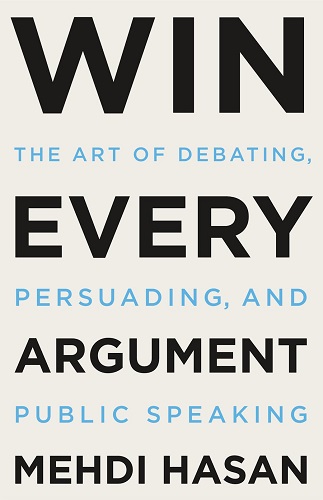
WIN EVERY ARGUMENT
by Mehdi Hasan
Win Every Argument shows how anyone can communicate with confidence, rise above the tit for tats on social media, and triumph in a successful and productive debate in the real world.
MSNBC’s Mehdi Hasan isn’t one to avoid arguments. He relishes them as the lifeblood of democracy and the only surefire way to establish the truth. Arguments help us solve problems, uncover new ideas we might not have considered, and nudge our disagreements toward mutual understanding. A good argument, made in good faith, has intrinsic value―and can also simply be fun.
Arguments are everywhere―and especially given the fierce debates we’re all embroiled in today, everyone wants to win. In this riveting guide to the art of argument and rhetoric, Hasan shows you how. As a journalist, anchor, and interviewer who has clashed with politicians, generals, spy chiefs, and celebrities from across the world, Hasan reveals his tricks of the trade for the first time.
Whether you are making a presentation at work or debating current political issues with a friend, Mehdi Hasan will teach you how to sharpen your speaking skills to make the winning case.
Still Hot in Non-Fiction & Biography
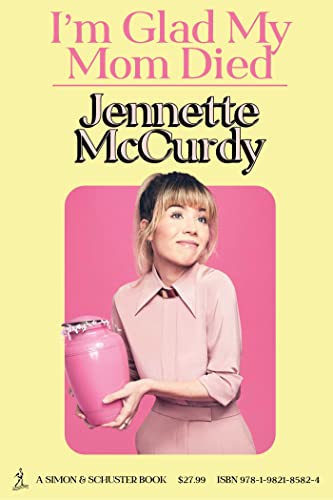
I'M GLAD MY MOM DIED
by Jennette McCurdy
#1 NEW YORK TIMES BESTSELLER
#1 INTERNATIONAL BESTSELLER
A heartbreaking and hilarious memoir by iCarly and Sam & Cat star Jennette McCurdy about her struggles as a former child actor—including eating disorders, addiction, and a complicated relationship with her overbearing mother—and how she retook control of her life.
Jennette McCurdy was six years old when she had her first acting audition. Her mother’s dream was for her only daughter to become a star, and Jennette would do anything to make her mother happy. So she went along with what Mom called “calorie restriction,” eating little and weighing herself five times a day. She endured extensive at-home makeovers while Mom chided, “Your eyelashes are invisible, okay? You think Dakota Fanning doesn’t tint hers?” She was even showered by Mom until age sixteen while sharing her diaries, email, and all her income.
In I’m Glad My Mom Died, Jennette recounts all this in unflinching detail—just as she chronicles what happens when the dream finally comes true. Cast in a new Nickelodeon series called iCarly, she is thrust into fame. Though Mom is ecstatic, emailing fan club moderators and getting on a first-name basis with the paparazzi (“Hi Gale!”), Jennette is riddled with anxiety, shame, and self-loathing, which manifest into eating disorders, addiction, and a series of unhealthy relationships. These issues only get worse when, soon after taking the lead in the iCarly spinoff Sam & Cat alongside Ariana Grande, her mother dies of cancer. Finally, after discovering therapy and quitting acting, Jennette embarks on recovery and decides for the first time in her life what she really wants.
Told with refreshing candor and dark humor, I’m Glad My Mom Died is an inspiring story of resilience, independence, and the joy of shampooing your own hair.
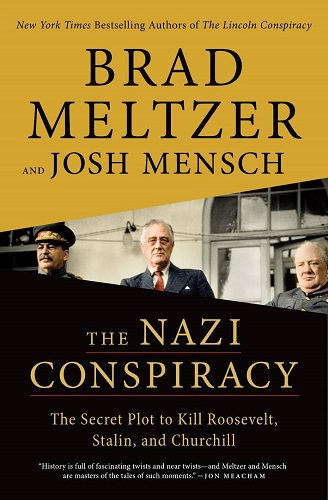
THE NAZI CONSPIRACY
by Brad Meltzer & Josh Mensch
INSTANT NEW YORK TIMES BESTSELLER
“An absolute home run! You will never look at WWII the same way again.” ―Brad Thor, #1 bestselling author
“Meltzer and Mensch are masters.” ―Jon Meacham, author The Soul of America
“A true story that reads like a thriller.” ―Alexander S. Vindman, LT. Col., U.S. Army (Ret.)
“An outstanding and memorable reading experience….a true page-turner from beginning to end.” ―Bookreporter.com
From the New York Times bestselling authors of The First Conspiracy and The Lincoln Conspiracy comes the little-known true story of a Nazi plot to kill FDR, Joseph Stalin, and Winston Churchill at the height of World War II.
In 1943, as the war against Nazi Germany raged abroad, President Franklin Roosevelt had a critical goal: a face-to-face sit-down with his allies Joseph Stalin and Winston Churchill. This first-ever meeting of the Big Three in Tehran, Iran, would decide some of the most crucial strategic details of the war. Yet when the Nazis found out about the meeting, their own secret plan took shape―an assassination plot that would’ve changed history.
A true story filled with daring rescues, body doubles, and political intrigue, The Nazi Conspiracy details FDR’s pivotal meeting in Tehran and the deadly Nazi plot against the heads of state of the three major Allied powers who attended it.
With all the hallmarks of a Brad Meltzer and Josh Mensch page-turner, The Nazi Conspiracy explores the great political minds of the twentieth century, investigating the pivotal years of the war in gripping detail. This meeting of the Big Three changed the course of World War II. Here’s the inside story of how it almost led to a world-shattering disaster.
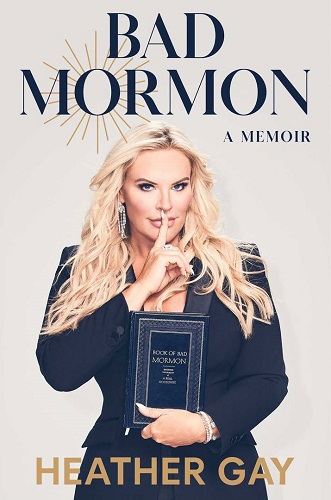
BAD MORMON
by Heather Gay
INSTANT NEW YORK TIMES BESTSELLER
As seen in The New York Times, People, The Cut, Vulture, The Daily Beast, Today, Bustle, Us Weekly, Life & Style, and Interview
Drinking and Tweeting meets Unorthodox in this vulnerable memoir about The Real Housewives of Salt Lake City star’s departure from the Mormon Church, and her unforeseen success in business, television, and single motherhood.
Straight off the slopes and into the spotlight, Heather Gay is famous for speaking the gospel truth. Whether as a businesswoman, mother, or television personality, she is unafraid to blaze a new trail, even if it means losing family, friends, and her community.
Born and bred to be devout, Heather based her life around her faith. She attended Brigham Young University, served a mission in France, and married into Mormon royalty in the temple. But her life as a good Mormon abruptly ended when she lost the marriage and faith that she had once believed would last forever.
